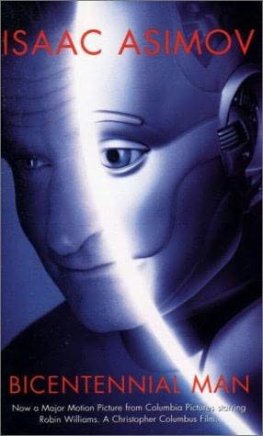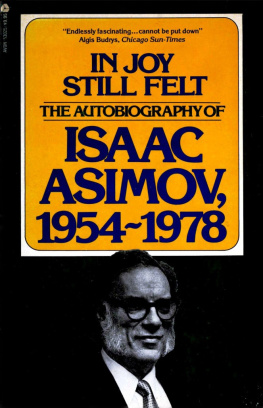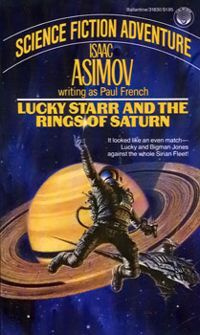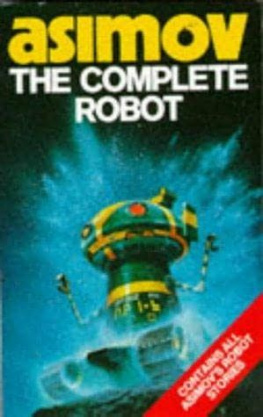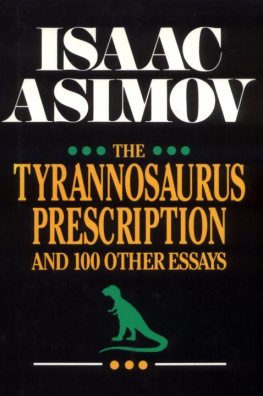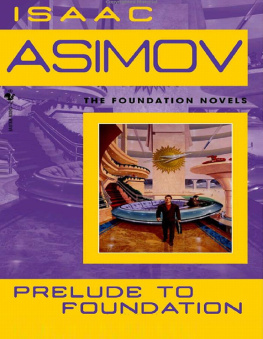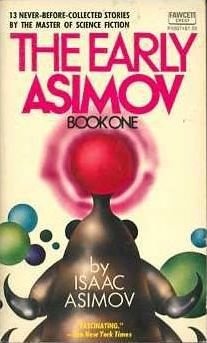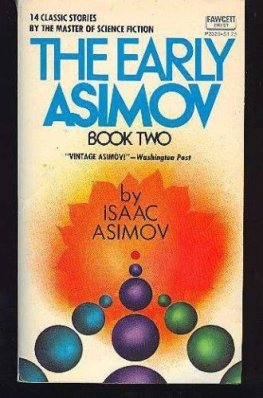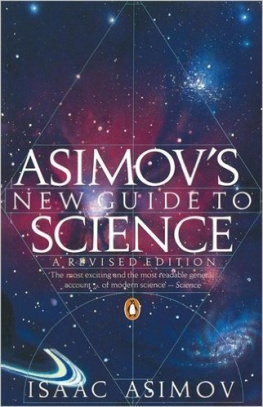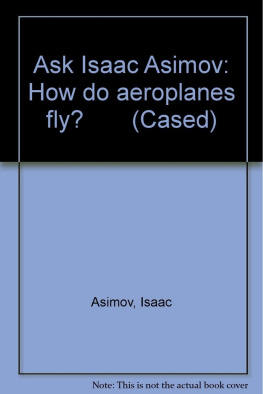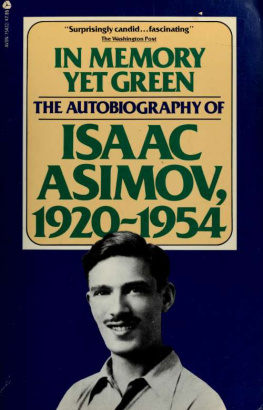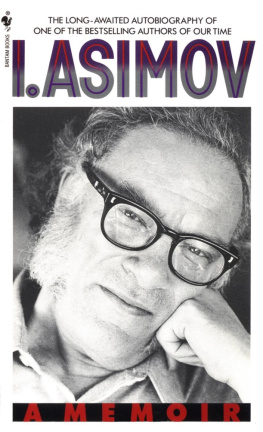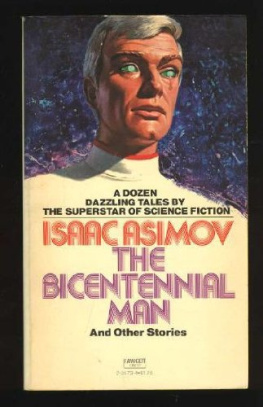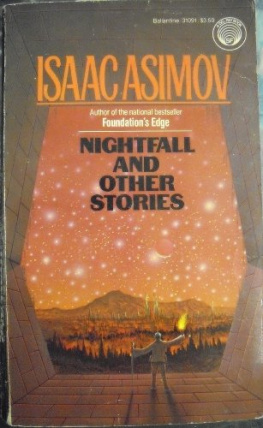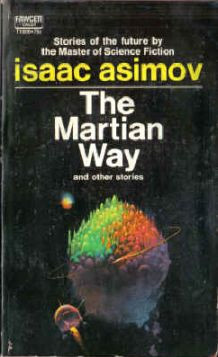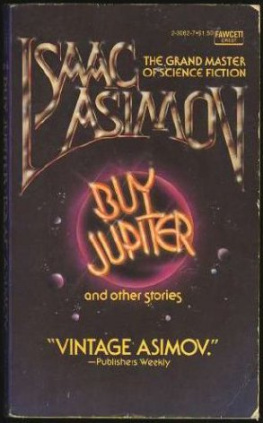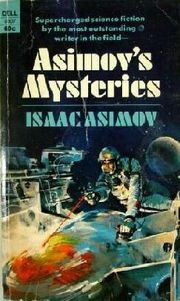Isaac Asimov - The Bicentennial Man and Other Stories
Here you can read online Isaac Asimov - The Bicentennial Man and Other Stories full text of the book (entire story) in english for free. Download pdf and epub, get meaning, cover and reviews about this ebook. year: 1976, publisher: Doubleday science fiction, genre: Science fiction. Description of the work, (preface) as well as reviews are available. Best literature library LitArk.com created for fans of good reading and offers a wide selection of genres:
Romance novel
Science fiction
Adventure
Detective
Science
History
Home and family
Prose
Art
Politics
Computer
Non-fiction
Religion
Business
Children
Humor
Choose a favorite category and find really read worthwhile books. Enjoy immersion in the world of imagination, feel the emotions of the characters or learn something new for yourself, make an fascinating discovery.
- Book:The Bicentennial Man and Other Stories
- Author:
- Publisher:Doubleday science fiction
- Genre:
- Year:1976
- ISBN:0-385-12198-9
- Rating:4 / 5
- Favourites:Add to favourites
- Your mark:
- 80
- 1
- 2
- 3
- 4
- 5
The Bicentennial Man and Other Stories: summary, description and annotation
We offer to read an annotation, description, summary or preface (depends on what the author of the book "The Bicentennial Man and Other Stories" wrote himself). If you haven't found the necessary information about the book — write in the comments, we will try to find it.
The Bicentennial Man and Other Stories — read online for free the complete book (whole text) full work
Below is the text of the book, divided by pages. System saving the place of the last page read, allows you to conveniently read the book "The Bicentennial Man and Other Stories" online for free, without having to search again every time where you left off. Put a bookmark, and you can go to the page where you finished reading at any time.
Font size:
Interval:
Bookmark:
Isaac Asimov
The Bicentennial Man and Other Stories
Dedicated to:
Judy-Lynn del Rey,
And the swath she is cutting in our field
Here I am with another collection of science fiction stories, and I sit here and think, with more than a little astonishment, that I have been writing and publishing science fiction now for just three-eighths of a century. This isnt bad for someone who only admits to being in his late youthor a little over thirty, if pinned down.
It seems longer than that, I imagine, to most people who have tried to follow me from book to book and from field to field. As the flood of words continues year after year with no visible signs of letting up, the most peculiar misapprehensions naturally arise.
Just a few weeks ago, for instance, I was at a librarians convention signing books, and some of the kindly remarks I received were:
I cant believe youre still alive!
But how can you possibly look so young?
Are you really only one person?
It goes even beyond that. In a review of one of my books [ASIMOV ON CHEMISTRY (Doubleday, 1974), and it was a very favorable review.] in the December 1975 Scientific American, I was described as: Once a Boston biochemist, now label and linchpin of a New York corporate authorship
Dear me! Corporate authorship? Merely the linchpin and label?
Its not so. Im sorry, if my copious output makes it seem impossible, but Im alive, Im young, and Im only one person.
In fact, Im an absolutely one-man operation. I have no assistants of any kind. I have no agent, no business manager, no research aides, no secretary, no stenographer. I do all my own typing, all my own proofreading, all my own indexing, all my own research, all my own letter writing, all my own telephone answering.
I like it that way. Since I dont have to deal with other people, I can concentrate more properly on my work, and get more done.
I was already worrying about this misapprehension concerning myself ten years ago. At that time, The Magazine of Fantasy and Science Fiction (commonly known as F & SF) was planning a special Isaac Asimov issue for October 1966. I was asked for a new story to be included and I obliged [That story was THE KEY, and it appears in my collection ASIMOVS MYSTERIES (Doubleday, 1968).], but I also wrote a short poem on my own initiative.
That poem appeared in the special issue and it has never appeared anywhere elseuntil now. Im going to include it here because its appropriate to my thesis. Then, too, seven years after the poem appeared, I recited it to a charming maiden, who, without any sign of mental effort, immediately suggested a change that was so inevitable, and so great an improvement, that I have to get the poem into print again in order to make that change.
I originally called the poem IM IN THE PRIME OF LIFE, YOU ROTTEN KID! Edward L. Ferman, editor of F & SF, shortened that to THE PRIME OF LIFE. I like the longer version much better, but I decided it would look odd on the contents page, so Im keeping the shorter version. (Heck!)
The Prime of Life
It was, in truth, an eager youth
Who halted me one day.
He gazed in bliss at me, and this
Is what he had to say;
Why, mazel tov, its Asimov,
A blessing on your head!
For many a year, Ive lived in fear
That you were long since dead.
Or if alive, one fifty-five
Cold years had passed you by,
And left you weak, with poor physique,
Thin hair and rheumy eye.
For sure enough, Ive read your stuff
Since I was but a lad
And couldnt spell or hardly tell
The good yarns from the bad.
My father, too, was reading you
Before he met my Ma.
For you he yearned, once he had learned
About you from his Pa.
Since time began, you wondrous man,
My ancestors did love
That s.f. dean and writing machine
The aged Asimov.
Id had my fill. I said, Be still!
Ive kept my old-time spark.
My step is light, my eye is bright,
My hair is thick and dark.
His smile, in brief, spelled disbelief,
So this is what I did;
I scowled, you know, and with one blow,
I killed that rotten kid.
The change I mentioned occurs in the first line of the second stanza. I had it read, originally, Why, stars above, its Asimov, but the aforementioned maiden saw at once it ought to be mazel tov. This is a Hebrew phrase meaning good fortune and it is used by Jews as a joyful greeting on jubilant occasionsas a meeting with me should surely be.
Ten years have passed since I wrote the poem and, of course, the impression of incredible age which I leave among those who know me only from my writings is now even stronger. When this poem was written, I had published a mere 66 books, and now, ten years later, the score stands at 175, so that its been a decade of constant mental conflagration.
Just the same, Ive kept my old-time spark even yet. My step is still light and my eye is still bright. Whats more, Im as suave in my conversations with young women as I have ever been (which is very suave indeed). That bit about my hair being thick and dark must be modified, however. There is no danger of baldness but, oh me, I am turning gray. In recent years, I have grown a generous pair of fluffy sideburns, and they are almost white.
And now that you know the worst about me, lets go on to the stories themselves or, rather (for you are not quite through with me), to my introductory comments to the first story.
The beginning of FEMININE INTUITION is tied up with Judy-Lynn Benjamin, whom I met at the World Science Fiction Convention in New York City in 1967. Judy-Lynn has to be seen to be believedan incredibly intelligent, quick-witted, hard-driving woman who seems to be burning constantly with a bright radioactive glow.
She was managing editor of Galaxy in those days.
On March 21, 1971, she married that lovable old curmudgeon Lester del Rey, and knocked off all his rough edges in two seconds flat. At present, as Judy-Lynn del Rey, she is a senior editor at Ballantine Books and is generally recognized (especially by me) as one of the top editors in the business. [You may have noticed that this book is dedicated to her.]
Back in 1968, when Judy-Lynn was still at Galaxy, we were sitting in a bar in a New York hotel and she introduced me, I remember, to something called a grasshopper. I told her I didnt drink because I had no capacity for alcohol, but she said I would like this one, and the trouble is I did.
Its a green cocktail with creme de menthe, and cream, and who knows what else in it, and it is delicious. I only had one on this occasion, so I merely graduated to a slightly higher than normal level of the loud bonhomie that usually characterizes me and was still sober enough to talk business. [A year or so later during the course of a science fiction convention, Judy-Lynn persuaded me to have two grasshoppers and I was instantly reduced to a kind of wild drunken merriment, and since then no one lets me have grasshoppers any more. Just as well!]
Judy-Lynn suggested I write a story about a female robot. Well, of course, my robots are sexually neutral, but they all have masculine names and I treat them all as males. The turnabout suggestion was good.
I said, Gee, thats an interesting idea, and was awfully pleased, because Ed Ferman had asked me for a story with which to celebrate the twentieth anniversary of Fantasy and Science Fiction and I had agreed, but, at the moment, did not have an idea in my head.
Font size:
Interval:
Bookmark:
Similar books «The Bicentennial Man and Other Stories»
Look at similar books to The Bicentennial Man and Other Stories. We have selected literature similar in name and meaning in the hope of providing readers with more options to find new, interesting, not yet read works.
Discussion, reviews of the book The Bicentennial Man and Other Stories and just readers' own opinions. Leave your comments, write what you think about the work, its meaning or the main characters. Specify what exactly you liked and what you didn't like, and why you think so.

